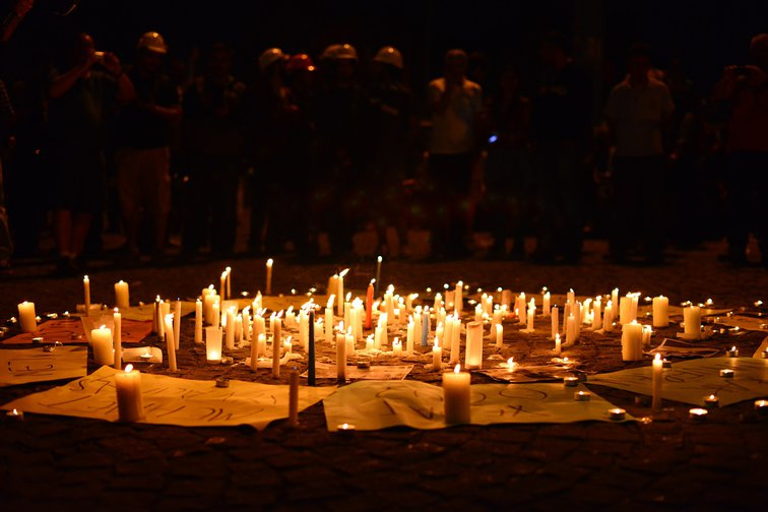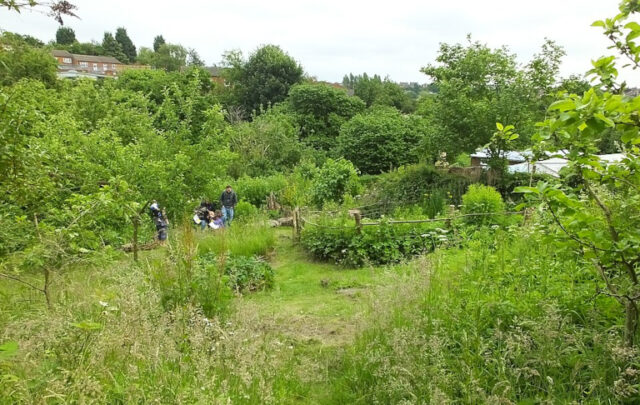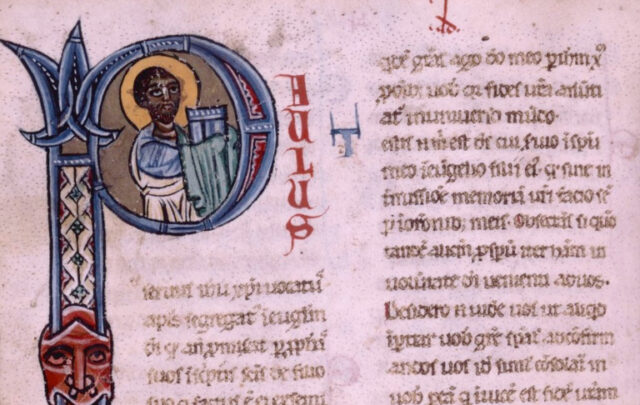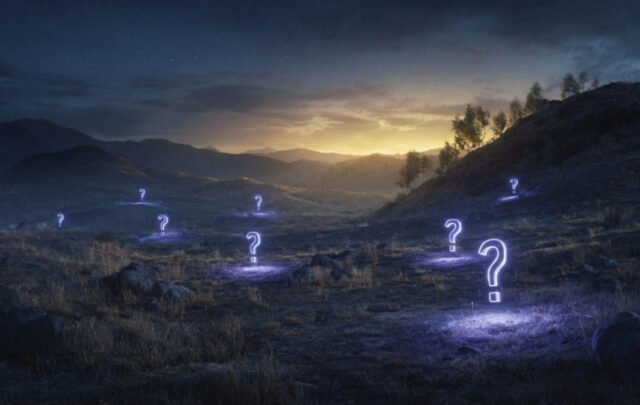We will survive the apocalypse. We will survive the apocalypse.
I’m sitting in a circle of plastic chairs in a small studio space on a Battersea estate in south London, intoning a chant to protect our group, and by extension the world, from the ravages of the climate crisis. We’re each clutching a ‘smudge stick’ – a bundle of herbs selected for their magical and healing properties created under the supervision of Ayesha Tan Jones, the creator of the cheekily named ‘Apocalypse Survival Skool.’
I’ve chosen thyme for its powers to strengthen memory and rosemary for its ability to heal discord. We’ve also included a bay leaf in our sticks, on which we’ve written a simple intention, prompted by the question of how to build new myths to help us survive ecological collapse.
I don’t normally attend this kind of thing, but I’d woken up that Saturday morning feeling particularly drained and alienated. Scrolling through the usual depressing news headlines, I’d spotted the Skool and decided to attend on a whim. It didn’t matter whether or not I ‘believed’ in the capacity of the chanting ceremony or the herbs to slow the rise in average global temperatures. Taking part in the ritual gave me a sense of togetherness and power which stayed with me for weeks.
In fact there’s a new wave of interest in creating ritual spaces and practices like these that are designed to meet the challenges of the 21st century. They’re not modelled on any particular faith but draw on an eclectic range of religious, magical and secular healing traditions.
Smudge sticks, for example, are all the rage, increasingly available in fashion stores and supermarkets. While they might be associated with Wicca or other witchcraft traditions, the burning of herbs for ritual purposes has been recorded for millennia. Tan Jones foraged for the herbs she uses in her local neighbourhood, recognising that this practice doesn’t belong to any particular culture. In fact, she made a point of not using Palo Santo, the ‘holy wood’ that’s burned in shamanic ceremonies in parts of South America, whose sudden popularity in the West is contributing to deforestation. What’s behind this new wave of interest?
Humans are ritualistic creatures. The Oxford English Dictionary describes a ritual as “A religious or solemn ceremony consisting of a series of actions performed according to a prescribed order.” Yet this is a peculiarly narrow definition. Such behaviours are encoded into our culture and aren’t necessarily religious or solemn – think of blowing out candles on a birthday cake or getting slaughtered on a stag do. Political protests are also ritualistic with their marching, drums and flag waving. But the explicit creation of new ritual practices suggests a desire for something more, particularly when it comes to facing the existential challenges of climate collapse.
Launched in October last year, Extinction Rebellion not only employs non-violent civil disobedience to push its demands for climate action, it has also curated its own ritual experiences such as ‘Remembrances for Lost Species,’ a ceremony to honour each extinct species by reading their name, followed by a moment of silence. While the inclusion of faith groups in political movements is fairly common, XR appears to be proposing a new kind of spiritual response to the existential threat of climate catastrophe. For example, ‘Rebellion Day’ in November 2018, which drew more than six thousand protestors, culminated in what was called a ‘Sacred Ceremony’ where three trees were planted in Parliament Square and the Sufi song ‘Always in Love’ was sung.
I asked Amy Hale, an educator and scholar of folklore, mythology and esoteric cultures, what she made of this development.
“When you make a conscious decision to do a ritual activity it provides a way to not just make meaning but help to shape a story in a very heightened way,” she told me. “There is a romanticism of the pre-modern…this idea that back in the day when people were primitive and lived ‘close to the earth’…they had these ritualised behaviours that led to an enchanted existence. We don’t have those things now and perhaps our mental health is suffering, so how can we bring some of those things back. I disagree that we don’t have a ritualised life…we’re not completely devoid of rituals, but I can also understand why there’s a need and desire for people to want to take that cultural technology, that we know will be effective.”
The cultural technologies Hale is referring to are practices that have been employed by many cultures across the globe to induce altered states of consciousness, such as breathing or drumming techniques, or the use of colour and sensory immersion, for which, as she puts it, “no-one has copyright.” The burning of herbs is another, as is the singing in XR’s Sacred Ceremony or the collective chanting of the names of the dead.
Yet there’s also a sense of anxiety and distrust in mainstream Western culture when it comes to ritual practice. Talking about the Sacred Ceremony, Skeena Finebaum-Rathor of XR’s ‘visioning group’ describes the ways in which XR is changing minds. “It was successful beyond what we imagined in terms of the feedback we got. People were saying ‘I’m not religious and at the beginning, I was really worried about this thing called a Sacred Ceremony, but I really enjoyed it and it changed everything for me.’ ”
As Hale points out, although we have rituals, Protestant culture has “worked very hard” to “strip away” certain kinds of practice from spiritual and religious life. It’s no wonder that some people might find them daunting.
Since Max Weber’s seminal book ‘The Protestant Ethic and the Spirit of Capitalism,’ much has been written on the Reformation and the extent to which sixteenth century Europe saw a turning away from those magical and Christian sacramental practices that gave worshippers what Augustine of Hippo called “an outward sign of an inward grace.” For Weber, these practices were discouraged to make room for the dominance of the Protestant work ethic, “the negative attitude of Protestantism to all the sensual and emotional elements in culture and in religion.”
While Weber has since been criticized for his Orientalist take on the difference between East and West, his concept of “the disenchantment of the world” has informed today’s renewed interest in the goal of “re-enchantment,” the longing for a return to a more embodied spiritual and imaginal life.
It is the emotional and sensuous elements of ritual that are being explicitly drawn on as tools with which to confront the existential challenges we face collectively. Another potentially crucial development is the changing legal status of psychedelic drugs. While one or two prominent members of XR have described the ritualistic use of psychedelics in their involvement in the movement, it’s a tricky area to research.
Julian Vayne, co-director of the Psychedelic Museum, not only suspects that the use of psychedelics has significantly impacted Extinction Rebellion, he also believes that – beginning with magic mushrooms – the trajectory of legalization in the West could profoundly influence the promotion of a more compassionate society. “It’s the question of how do we come together as people for these powerful moments that we know heal us,” he says, “the skills that we require of reciprocity and of negotiation and sensitivity and spontaneity, serve us well in a variety of senses…really it’s about our relationship with others.”
Vayne is also Chair of The Friends of The Boscastle Museum of Witchcraft, and his ‘Getting Higher: The Manual of Psychedelic Ceremony’ draws from a variety of different religious, magical and cultural traditions to provide “a manual of techniques for people who want to explore these drugs in a safe, sane and consensual way for spiritual illumination, personal transformation and ecstatic communion.” For him, the growing interest in ritual practices in mainstream Western culture is a welcome development.
Recent how-to manuals like ‘Rituals for Every Day’ by self-help teachers Nadia Narain and Katia Narain Phillips, published by Hutchinson last year, which promises to help individuals “press the pause button on the pace of modern life,” are increasingly being joined in major bookstores by titles like ‘Witchery: embrace the witch within’ by Juliet Diaz who runs Tierra Sagrada, a “school and sisterhood” providing social networks and online courses in healing and magical practices.
Vayne believes that a renewed interest in ritual as part of an eclectic spiritual revival has powerful transformative potential. “This idea of curating your own spirituality, developing that in community with other people, with these fluid affinity groups, that is the way this will go, unless there’s some sort of major social effect elsewhere.”
Much has been said about the decline of religious affiliation in the West, particularly among younger generations. Yet today it might be said that the West is suffering more from a crisis of ritual than a crisis of faith. Although Christianity is still the dominant religion, across Western Europe non-practicing Christians outrank church-goers. In the UK, around seventy-three percent of people still identify as Christian, but only one in three are ‘practicing.’
In a mainstream that places insufficient emphasis on communal ritual, we may be losing access to cultural technologies that have been used throughout human history. By consciously attempting to ‘re-enchant the world,’ we can help to create and maintain social bonds as well as our connection to the living earth.
Who knows? We might even stand a chance of surviving the apocalypse.























